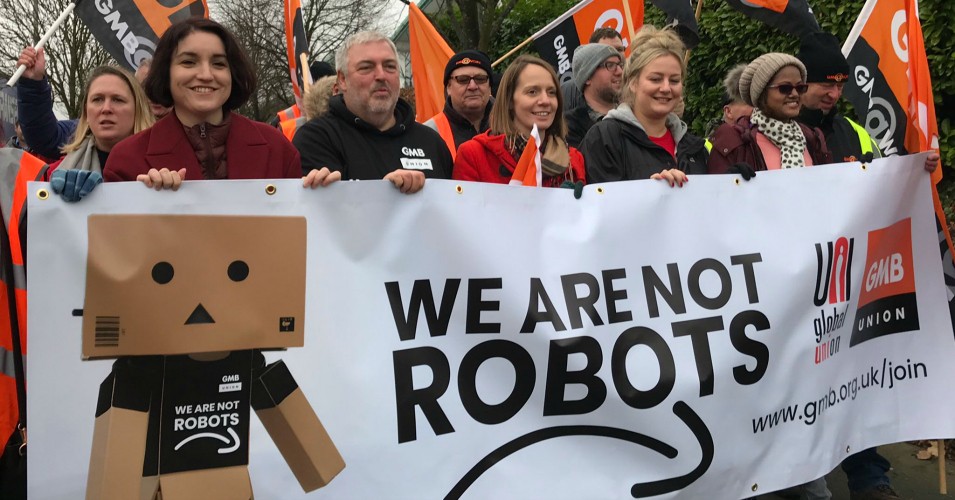Employees of IT giants have figured out how to influence the policies of their companies.

Silicon Valley IT companies have long since awarded their employees with stocks. A great way to increase developer loyalty and make them personally interested in the success of the project. But this led to an unexpected effect. Now ordinary programmers are starting to use this compensation package to influence the decisions of their employers. In all companies, from small startups - and to Amazon, Facebook and Google, having united, they begin to decide for themselves which projects the company shouldn’t undertake, and how their innovations can be used.
Several dozen Amazon employees who received promotions in the form of shares acted as shareholders of the company. In early December, they sent identical petitions, offering the online giant to release a detailed plan of how it, with its millions of square meters of warehouses, executive centers and data centers, is going to help combat climate change.
Now the proposal of the employees will be put up for discussion at the next meeting of shareholders. Even if they do not approve of it, Bezos and the others will know that such an opinion exists, and once again will think that it would be nice to make the company a little less dependent on fossil fuels. Together, developers have enough capital in Amazon to become visible to management.

Pan - the second of those standing, Emily Cannigan - the first of those sitting
Eliza Pan, a program manager in one of the Amazon sectors, who has been with the company for 5 years, says:
We understood that from the position of an employee no one hears us. But if we appear in another person, in the form of a shareholder, our word will mean much more. This is how it works. We want this problem to become visible to the board of directors and the leaders of our company who make the decision.
To be eligible to submit bids as a shareholder, an Amazon employee must own shares of companies for at least $ 2,000 during the year. Tens (possibly hundreds?) Of thousands of workers were previously given $ 1,000 worth of shares at the end of the year, in honor of their work for Black Friday and Christmas. It turns out that it was enough for the employee to work for two years in order to become a full-fledged (albeit a minority) shareholder of the company. This year, as Amazon’s stock value rose and senate pressure increased, the company stopped offering this form of compensation simply by directly raising the minimum wage. Now only people in key positions will receive shares - the main developers, department leaders, and managing managers.

Trick (literally!) Google employees
But the old shares of the workers remain, and this is a package of at least several hundred million, which cannot be ignored. Earlier, a similar process went through the Alphabet. This March, Google employees filed a petition as shareholders of the company, offering to link the payment to managers to fulfill the goals of eliminating racial and gender discrimination within the company. The board of directors listened to the proposal and eventually rejected, but the initiative group inside Google is going to put it back on the agenda in 2019.
Yana Kalu, a coworker.org organization manager who helps employees organize joint campaigns, explains:
The risks for employees, users, and shareholders are actually much the same. They all want the company to be as good as possible. Risks for employees are also risks for shareholders, so there really is a natural union of common interests.
After raising the issue with her employees, Amazon, one of the largest companies in the world, commented on how she is going to help fight global warming:
We set a goal - that our global infrastructure works on 100% of renewable energy sources, and also invest in “green” energy and sponsor innovations in order to increase its efficiency.
The company has installed large solar panel systems at 25 executive centers, and says it is trying to reduce the amount of packaging materials used, optimizing the packaging process.
Emily Cannigan, another Amazon activist, explains her position:
It is important for a person to change something for the better, to work on changes, even if small, wherever you are. I happened to work for Amazon, which means I’ll try to change the world from here.
Many of those. Companies in the last year faced the "problem" of the "uprising" of their employees. Employees of Amazon, Microsoft, Salesforce and Google publicly protested against the decisions of their companies. So Google was forced to abandon a very lucrative contract with the Pentagon to develop technology for "drones-killers." The staff said they would not work on it, and went on marches against the idea of "creating things that help kill people."
And last month, 20,000 employees of Google left the corps and began chanting slogans, protesting against the company hiding the facts of sexual harassment at work, and paying large compensations for the dismissal of such managers. One of the slogans on the poster read:
What am i doing at google? I work every day so that the company can afford to pay $ 90 million to managers who sexually harass my colleagues.

Larry Page, Sundar Pichai and YouTube head Susan Wojcicki instantly announced structural changes, apologized, and said that from now on such cases would be referred to arbitration. They also said that in the past two years, of 48 people dismissed in response to allegations of sexual harassment, not one had received severance pay.
At the same time, Facebook employees from this summer are trying to change the company's policy, uniting into groups in order to make it “more tolerant” (which, in their understanding, means less tolerant of groups and right-wing politicians).
Employees in the IT industry are in a unique position. They mostly have enough money to live on, they are not so afraid of being fired, and they can easily find work in another company if the situation becomes very hot. Plus - many have stocks in their company, which, for example, no one car builder or airline pilot has. Therefore, more and more developers are becoming part-time “shareholder activists”, offering their ideas about what, in a global sense, companies need to do.
Heads of companies often do not like this state of affairs (you will not please everyone), but perhaps this also has advantages for the company. First of all, the issue of a problem that previously could have passed by the top managers is raised. Secondly, employees are becoming more involved in the life of the company, for which, in many respects, such an incentive program was originally conceived.
As for the effectiveness of the proposals themselves - the likelihood that they will seriously force the company to change its course, even if the petition is submitted by thousands of minority shareholders, is rather low. In all major IT giants, the main word now remains for their founders. Amazon's main shareholder is Jeff Bezos, with 16%. Alphabet's main shareholders are Sergey Brin and Larry Page, they have 51% of the company's voting shares. If their decision goes against the opinions of all other shareholders, they can still easily insist on their own.
But combining IT employees say that this is not the case. Shareholder proposals are submitted for discussion and negotiated. They are distributed to other shareholders, they are included in annual reports. This is the only way to directly communicate your problems to the board of directors and CEOs, and not just to managers. And their joint voice can help to incline the scales in one direction or another.
In addition, it has been proven that such methods of action really work. For example, one of the largest shareholders in any large stable IT business behaves - the Norwegian State Pension Fund. Owning stocks of $ 300-400 billion (1.5% of the global stock market!), He often brings the most unexpected and progressive proposals to the agenda of IT-companies. And blocks more than 6,700 solutions for them in a year! Through its foundation, small Norway is able to impose its values on the world — for example, by prohibiting all companies in which it invests to sell weapons, engage in corruption scandals, and in any way encourage racial discrimination.
For example, Facebook under pressure from Norway this summer was forced to introduce an algorithm for stopping fake news and promised to level the salaries of women in their company with the salaries of men in similar positions. Both proposals for the shareholders meeting were made by representatives of the Norwegian Petroleum Fund.

